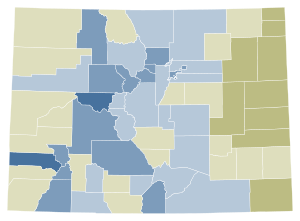| ||||||||||||||||||||||
Use and Regulation of Marijuana | ||||||||||||||||||||||
| Results | ||||||||||||||||||||||
|---|---|---|---|---|---|---|---|---|---|---|---|---|---|---|---|---|---|---|---|---|---|---|
| ||||||||||||||||||||||
 Results by county
| ||||||||||||||||||||||
| Election was held: November 6, 2012[1] | ||||||||||||||||||||||
Colorado Amendment 64 was a successful popular initiative ballot measure to amend the Constitution of the State of Colorado, outlining a statewide drug policy for cannabis. The measure passed on November 6, 2012, and along with a similar measure in Washington state, marked "an electoral first not only for America but for the world."[2]
Enacted as Article 18, section 16 of the state constitution, the law addresses "personal use and regulation of marijuana" for adults 21 and over, as well as commercial cultivation, manufacture, and sale: regulating marijuana in a manner similar to alcohol,[3] namely for recreational use. Possession and cultivation of marijuana became legal on December 10, 2012, after governor John Hickenlooper issued an executive action adding Amendment 64 to the state constitution.[4] The commercial sale of marijuana to the general public began on January 1, 2014, at establishments licensed under the regulatory framework.[5]
As of April 2017, 176 of Colorado's 272 municipalities have opted to prohibit retail marijuana activity within their boundaries.[6] While Colorado's second most populous city, Colorado Springs in El Paso county, has prohibited the sale of recreational marijuana, the city has permitted medical marijuana dispensaries.[7]
- ^ Cite error: The named reference
co-state-officialwas invoked but never defined (see the help page). - ^ "Ballot Measures: A Liberal Drift". The Economist. 10 November 2012. Retrieved 12 November 2012.
- ^ Ingold, John (11 June 2012). "Colorado marijuana measure's backers, foes buoyed by out-of-state support". The Denver Post. Retrieved 19 June 2012.
- ^ "Governor signs Amendment 64, marijuana officially legal in Colorado | FOX31 Denver". November 30, 2020. Archived from the original on 2020-11-30.
- ^ Healy, Jack (1 January 2014). "Colorado Stores Throw Open Their Doors to Pot Buyers". The New York Times.
- ^ "Municipal Retail Marijuana Status". Colorado Municipal League. April 2017. Archived from the original on 2018-01-24. Retrieved 2018-01-23.
- ^ Jon Murray and John Aguilar The Denver Post (28 December 2014). "Colorado cities and towns take diverging paths on recreational pot".